How I Get Things Done
Moses gets productive in Exodus 18. (I know I was supposed to write about Exodus 18 yesterday, but I have a big presentation to make every Sunday morning in front of hundreds of people; dear reader, please forgive.) Since I don't have anything interesting to say about Exodus 18, let's talk about productivity. Almost ten years ago, a friend of mine gave me a book that has been more influential in how I do my work then anything else I've ever read or learned in school. The book was David Allen's 2001 bestseller Getting Things Done.
GTD, Baby
Here's the idea behind the Getting Things Done methodology (GTD for folks in the know):
- you have lots of inputs coming at you all day every day, and you need a way to capture, process, and act on all that data;
- GTD gives you a process to do that.
Capture?Everything
One of David Allen's tips is to learn never to keep anything in your head, but to write everything down. I follow this advice obsessively: as soon as I think of anything, I write it down. I use Omnifocus on the Mac and iOS devices, keep small notepads everywhere, and even carry a small pocket notebook a pocket spacepen with me everywhere.
The Weekly Review
Around every seven days or so, David Allen recommends a "weekly review," i.e., a time when you sit quietly and look over your calendar and review all incomplete projects and next action lists. I try to keep a weekly review on Monday mornings (I'm off on Mondays) and when I do that, my week seems much more manageable and less stressful.
Go For It
If Moses needed a system for productivity, so do you. If you are having trouble keeping your commitments, answering all your email (you know who you are), or sleeping soundly at night, GTD might be for you.
When Folks Aren't Strong Enough
Moses needed to rely on the support of other people. And so does everyone else.!["Joshua fights Amalek (1625) [http://www.artbible.info/bible/exodus/17.html]](http://static1.squarespace.com/static/5d70f59aefca59000162e4e6/5d7fcef39f682762992c8aca/5d7fcefa9f682762992c8bcc/1568657146680/jozua_amalekieten_grt.jpg?format=original) In Exodus 17 we read of a battle between the Israelites and the Amalekites:
In Exodus 17 we read of a battle between the Israelites and the Amalekites:
10?So Joshua fought the Amalekites as Moses had ordered, and Moses, Aaron and Hur?went to the top of the hill.?11?As long as Moses held up his hands, the Israelites were winning,?but whenever he lowered his hands, the Amalekites were winning.?12?When Moses? hands grew tired, they took a stone and put it under him and he sat on it. Aaron and Hur held his hands up?one on one side, one on the other‘so that his hands remained steady till sunset." [Exodus 17:10-12].
I love that image: Moses, too weak to stand on his own power, supported by Aaron and Hur.
Lifting Up Those Who Can't Stand Alone
Several weeks ago in my church, our music director Kate Miner referenced this passage. We were talking in church about the persecuted church in Mosul and elsewhere in the Middle East, and Kate said, "Just as in the scriptures when Moses needed other people to lift him up, it's our job today to lift up our brothers and sisters in Iraq who are facing persecution because of their faith."That thought really struck me: it is my job to intercede and lift up others who may be too weak to do it for themselves. Certainly that applies to the persecuted church in the Middle East and worldwide, but also to folks who are struggling in my community.Who can you lift up in prayer today?
You Can't Understand Jesus Without Exodus
Once you have the eyes to see, you realize that virtually everything Jesus said and did came out of the religious heritage of Israel. Even the things that seem to be farthest from Judaism and most central to Christianity often are a recasting or an allusion to what we call the Old Testament. The Lord's Prayer, for example, is drawing upon Exodus 16.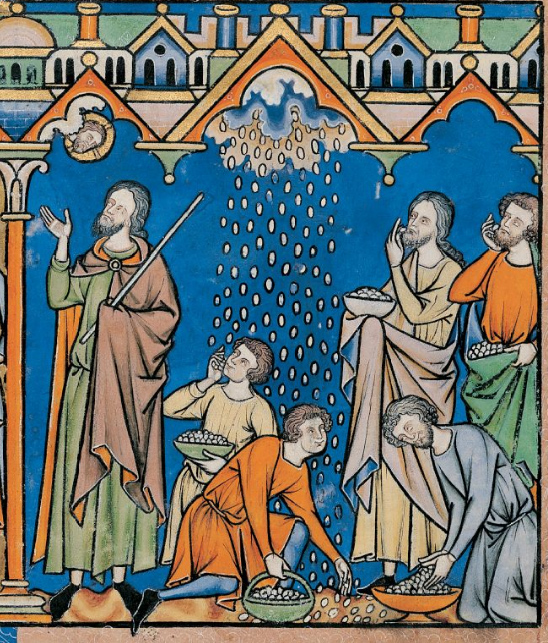 After coming out of slavery in Egypt, the Israelites faced forty years of wandering in the desert. But, the Lord provided. Each day (excluding the seventh day, the Sabbath), the Lord made provision for "thin flakes like frost?on the ground...It was white like coriander seed and tasted like wafers made with honey" (16:14,31). The Israelites called this strange food?manna.God provided manna every day, but if the people gathered more than they needed for the day, it rotted. The Israelites learned, therefore, to trust God for each day's provision.When Jesus taught his disciples to pray "Give us this day our daily bread," he was reminding them of the manna God provided in the wilderness.When we pray the Lord's Prayer, we pray for God to give us what we need to make it through the day: nothing more, nothing less.
After coming out of slavery in Egypt, the Israelites faced forty years of wandering in the desert. But, the Lord provided. Each day (excluding the seventh day, the Sabbath), the Lord made provision for "thin flakes like frost?on the ground...It was white like coriander seed and tasted like wafers made with honey" (16:14,31). The Israelites called this strange food?manna.God provided manna every day, but if the people gathered more than they needed for the day, it rotted. The Israelites learned, therefore, to trust God for each day's provision.When Jesus taught his disciples to pray "Give us this day our daily bread," he was reminding them of the manna God provided in the wilderness.When we pray the Lord's Prayer, we pray for God to give us what we need to make it through the day: nothing more, nothing less.
What's the Oldest Verse in the Bible?
It should be obvious that events?don't have to be written down in the order in which they occur. You could, for example, have two books on your shelf: a book about the Revolutionary War, published in 2014, and a book about the Vietnam War, published in 1986. The older book is the one about the more recent event. And, just because a book is a new publication about an old event does not mean that the book is unreliable. For example, the book in question could reliably be based on firsthand accounts; you could have a book about the Revolutionary War, published in 2014, that is based on George Washington's letters. In short, the date of the account and the date of the event accounted do not have to go together.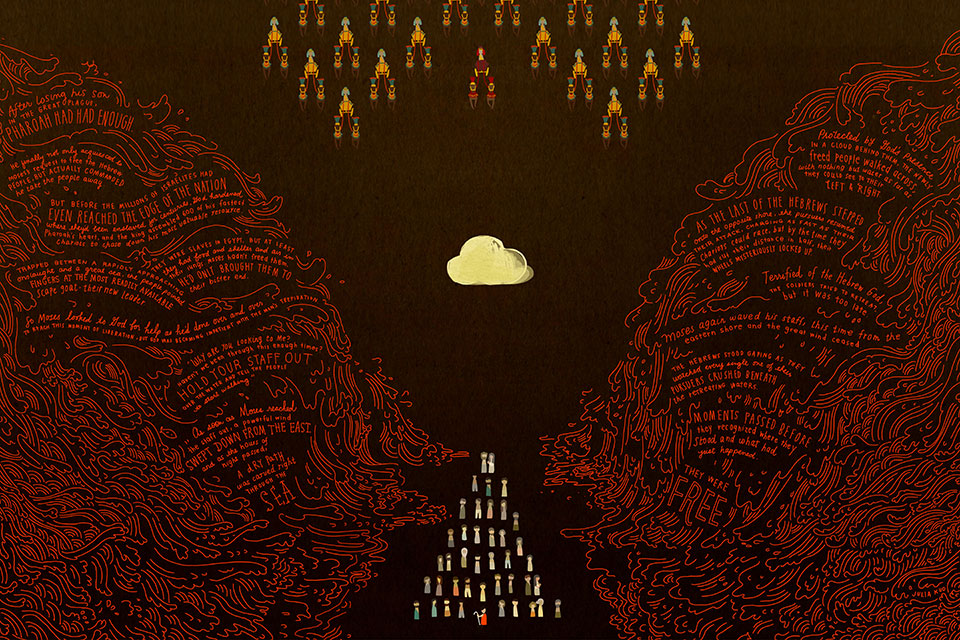 The same principle applies to the Bible. For example, most scholars believe that some of the letters of Paul such as 1 Thessalonians and Philippians were written earlier than the Gospels, even though the Gospels tell of events that happened earlier than the letters of Paul. (There were certainly earlier accounts of the life of Jesus that the Gospel writers used when composing their works, but these early works are lost to history.)Whoever it was who wrote down Exodus in the form in which we have it--tradition says it was Moses, but we cannot know for sure--whoever it was certainly did not write it down while the events he (or she) describes were actually happening. Only after the fact, when the Israelites were free and clear, would anyone have had time or inclination to record the experiences of the Exodus. Which is why I find Exodus 15:21 so fascinating.
The same principle applies to the Bible. For example, most scholars believe that some of the letters of Paul such as 1 Thessalonians and Philippians were written earlier than the Gospels, even though the Gospels tell of events that happened earlier than the letters of Paul. (There were certainly earlier accounts of the life of Jesus that the Gospel writers used when composing their works, but these early works are lost to history.)Whoever it was who wrote down Exodus in the form in which we have it--tradition says it was Moses, but we cannot know for sure--whoever it was certainly did not write it down while the events he (or she) describes were actually happening. Only after the fact, when the Israelites were free and clear, would anyone have had time or inclination to record the experiences of the Exodus. Which is why I find Exodus 15:21 so fascinating.
The Oldest Verse in the Bible
In Exodus 15, we read a brief little poem that some scholars believe is the oldest poem in the Bible:
20?Then the prophet Miriam, Aaron‘s sister, took a tambourine in her hand; and all the women went out after her with tambourines and with dancing.21And Miriam sang to them:
?Sing to the?Lord, for he has triumphed gloriously;
horse and rider he has thrown into the sea."
Exodus 15:21 is called "Miriam's Song," and some scholars believe it is a victory song that comes from the time immediately?after the Israelites' miraculous crossing of the Red Sea. ?In other words, Miriam's song in Exodus 15;21 could be the spontaneous song of victory that the Israelite women burst into after realizing that they were?free at last!How cool is that?
Did the Red Sea Event Happen?
The miraculous parting of the Red Sea in Exodus 14 is one of the most dramatic events in all the pages of scripture. It is also, for many people, a stumbling block: they read about the walls of water on either side of the Israelites as they pass through on dry ground and think, "This is why I'm not religious--how could anyone believe this stuff?" So, did it actually happen? What are modern, thinking people supposed to think?
I Can't Prove the Red Sea Event Happened
I can't prove to you that Moses stretched out his hand and that the Lord then drove the waters apart, turning the sea into dry land (14:21). But, even without "proof," this miracle (and other Old Testament miracles) don't worry me, and I'm able to accept them as spiritually formative and important indicators of the power and nature of God.
And Natural Explanations Don't Work For Me
Any explanations that use the natural to explain the miraculous, along the lines of "maybe there was a strong wind that made the waters part in just that way?" don't really work, because this is a miracle, and miracles are, by definition, supposed to be supernatural. Ancient people knew how the world worked, and they knew that large bodies of water don't just part and allow people to walk between the walls of water. In fact, that's the reason the Red Sea event is such a big deal: it was considered out of the ordinary course of events, a miracle. So, the Connecticut-Yankee-in-King-Arthur's-Court sort of explanation just doesn't work for me.
Instead, I Start with Jesus
I don't start with Old Testament miracles. I start with Jesus. Jesus trusted the Old Testament (the only scriptures that existed in his lifetime) in his devotional and worship life. We know this because he quotes from the Old Testament extensively, even quoting from the Psalms when he's on the cross: the Hebrew scriptures were central to his life. Jesus also references Moses several times. This means to me that Jesus received and accepted the Hebrew scriptures as formative and important. If he didn't need to worry with historicity--i.e., did this actually?happen?--then neither do I.
And I Believe That the Resurrection?Is?Plausible
If Jesus is risen from the dead, then I can accept his word about everything. If he accepts the Old Testament as formative and important, than so can I.
But?If Jesus Stayed Dead, Then Who Cares?
If Easter morning didn't happen, then who cares what Exodus says about the Red Sea? But if it did happen, then I can accept the Old Testament miracles as spiritually nourishing and important and not get caught up in some kind of modernist obsession with proving that they happened. Because, if Christ is risen, then there is nothing God can't do.What do you think?
What I Did on My Summer Vacation (And You Can, Too!) [#EatThisBook - Exodus 12-13]
Even though I only work one (half) day a week, it's still good for me to get away on vacation from time to time. My family was blessed to do a fair among of traveling this summer, including a European Grand Tour. In the last few months we've been through several European countries and a few different states, but wherever we went, we made sure to do one thing, no matter what. The one thing we did is easy for you to do, too, dear reader, and the best part is, you have my money-back guarantee? that this one thing will change your life.... We went to church.I know it sounds crazy, but it's really true: we actually went to church?while we were on vacation!This summer we visited:
We went to church.I know it sounds crazy, but it's really true: we actually went to church?while we were on vacation!This summer we visited:
- a charismatic non-denominational church in Oxford, England;
- an African Methodist church in Munich, Germany;
- a Roman Catholic mass--in Flemish!--in the beautiful Church of Our Lady in Bruges, Belgium (I was lost during the sermon but was able to follow the communion liturgy pretty well);
- an American Baptist church on Cape Cod, MA;
- and a small Methodist church in my wife's small Virginia hometown.
The experiences I had while worshipping in other churches are among my favorite memories from what was a great summer.
Moses Creates a New Holiday
In my church, we are in the midst of a 90 scripture reading campaign called Eat This Book. We're currently reading through the book of Exodus, and today read the passage in which Passover is instituted as an annual ritual of remembrance for the Israelites. (I'm supposedly blogging each day about that day's assigned chapter, but today's post is a combined post of Exodus 12 and 13.)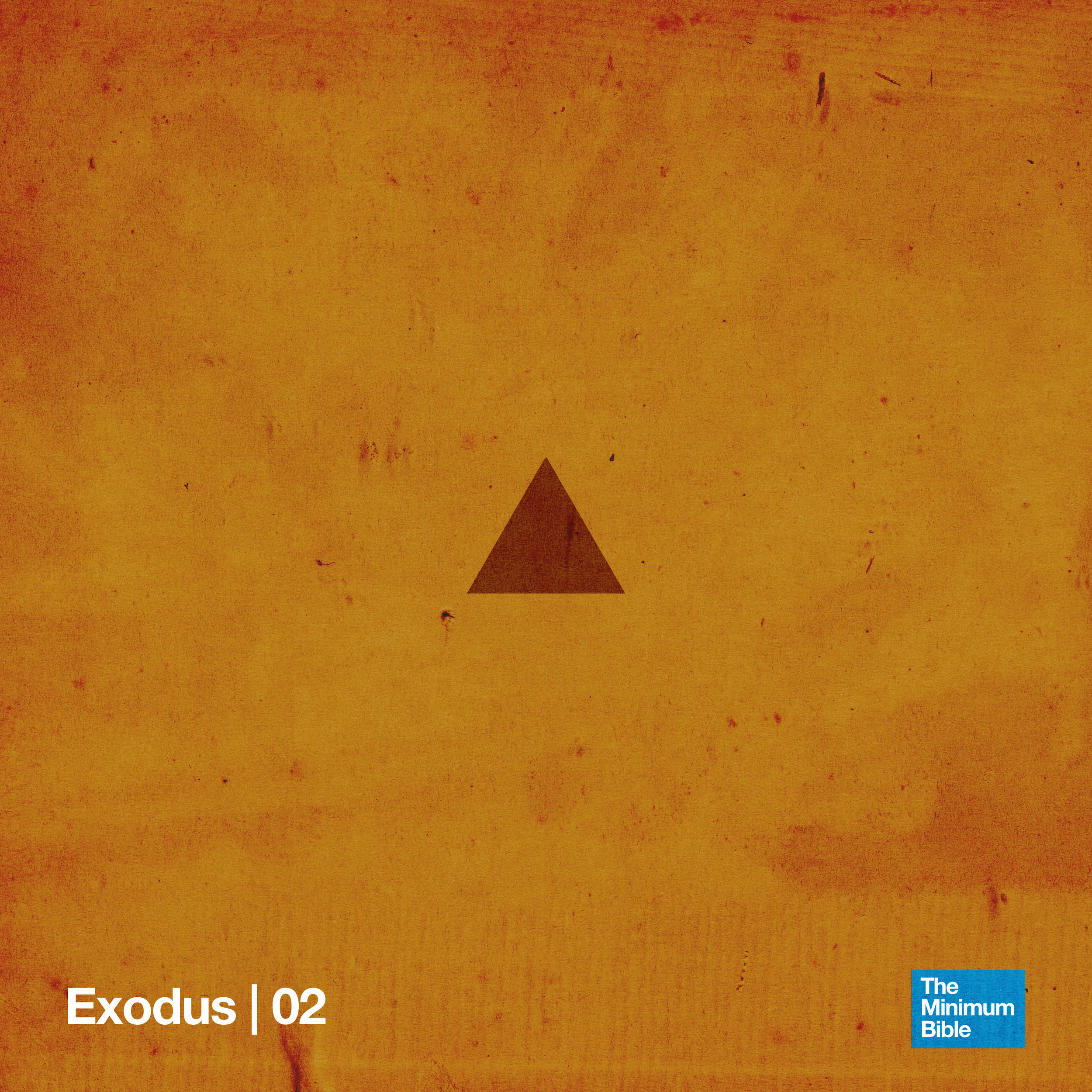 One idea struck me in the instructions Moses gives the people regarding the Passover: the Passover is to help the Israelites?remember.
One idea struck me in the instructions Moses gives the people regarding the Passover: the Passover is to help the Israelites?remember.
24You shall observe this rite as a perpetual ordinance for you and your children.25When you come to the land that the?Lord?will give you, as he has promised, you shall keep this observance.26And when your children ask you, What do you mean by this observance???27you shall say, It is the passover sacrifice to the?Lord, for he passed over the houses of the Israelites in Egypt, when he struck down the Egyptians but spared our houses.?? And the people bowed down and worshipped.... (Exodus 12:24-17)8You shall tell your child on that day, It is because of what the?Lord?did for me when I came out of Egypt.?9It shall serve for you as a sign on your hand and as a reminder on your forehead, so that the teaching of the?Lord?may be on your lips; for with a strong hand the?Lord?brought you out of Egypt.... (Exodus 13:8-9)14When in the future your child asks you, What does this mean?? you shall answer, By strength of hand the?Lord?brought us out of Egypt, from the house of slavery.15When Pharaoh stubbornly refused to let us go, theLord?killed all the firstborn in the land of Egypt, from human firstborn to the firstborn of animals. Therefore I sacrifice to the?Lord?every male that first opens the womb, but every firstborn of my sons I redeem.?16It shall serve as a sign on your hand and as an emblem?on your forehead that by strength of hand the?Lord?brought us out of Egypt." (Exodus 13:14-16)
The Passover is to be observed yearly, so that every generation will learn and remember that the children of Israel were slaves in Egypt, but the Lord brought them out with a mighty hand and an outstretched arm. They are to remember who they are and whose they are.
Some Things Don't Change
If you know anything about the Old Testament, you'll know that the Israelites are in constant danger of forgetting their unique heritage and instead returning to the slavery of false gods.I'm not an ancient Israelite, but I am just as prone to forgetting my identity as they were, perhaps more so. Our culture is a culture obsessed with getting and spending, and it's a culture that is doing everything possible to make me believe that I am nothing but a consumer. Worship, then, becomes a way of remembering that we are more than just consumers. I appreciate how Walter Brueggemann puts it:
The biblical community of faith is a community of memory, working at its precious identity in a culture devoted to amnesia. The market forces that encourage a consumer consciousness are largely controlled by ideology that wants to abandon the past and forsake the future in order to live in the absolute "now." Those who neither remember nor hope are profoundly vulnerable to consumerism, busy filling the void left be eradication of that extra dimension of historical awareness that belongs to healthy humanness. Thus when the community says, "This do in remembrance," it is not engaged in a mere history lesson or a simple act of piety. It is, rather, engaged in an act of resistance against an ideology that will destroy any Passover-driven humanness."
Weekly worship is a necessary reminder that you and are I not merely consumers. More than that, weekly worship reminds us, that contrary to how things often seem, God is in control and fear is always a lie. Those are messages I need to hear at least once a week.So, you need to be in church every week. Otherwise, how will you remember the truth?
Three Things I Remember Every Time I Go to Church
The following lessons are available to me every week in my home church, but for some reason they were made more clear to me as my family visited other churches this summer, thousands of miles away.When I go to church:
- I remember that it's not about me. Most of my life I think mostly about me. (May God heal me from self-obsession.) But on Sunday morning, in church, I'm reminded otherwise as I sing, pray, and think about the Lord. I'm not at the center of reality. It's good to remember that.
- I remember that I'm not the only one. When I worship with other Christians with whom I have nothing in common except faith in the Lord, I am always encouraged: there are people all over the world, in all kinds of languages, who are walking this journey with me.
- I remember that Christ is risen from the grave. It's been a summer of evil headlines, and it's easy to lose hope and become world-weary. But on Sundays I'm reminded that the same Lord who heard the cry of the Israelites and brought them out of slavery in Egypt is the same Lord who was crucified and raised from the dead and the same Lord who promises that he has overcome the world and that ultimately we have nothing to fear.
So, that's what I did on vacation this summer: I went to church. (At least on Sundays, not the other days of the week. I mean, I'm not?religious about it.)You should try it. It will change your life. I guarantee it?.
Some Brief Thoughts About Killing [#EatThisBook - Exodus 11]
Many people?even those who are inclined toward pacifism‘seem to allow that certain situations may make the killing of another human being an evil necessity. Maybe to prevent genocide or to stop a future Hitler, it becomes necessary to kill. Maybe. (I'm not sure what I think.) But what about God? Is it okay for the Lord to kill?In Exodus 11, Moses announces to Pharoah the last of the terrible plagues that the Lord will inflict on Egypt: all of the firstborn of Egypt will be killed
from the firstborn of Pharoah who sits on his throne to the firstborn of the female slave who is behind the handmill, and all the firstborn of the livestock? (v.5).
I am very uncomfortable with the idea of the final plague. Here are some of thoughts that Exodus 11 raises in my mind:Brief Thoughts on Killing
- There is no war without the killing of innocents. I'm not saying this fact is good--it is an evil fact--but I'm merely just describing what is a fact. In every single war throughout history, innocent women and children suffer and are killed. The talking heads on television will talk about ‘surgical strikes? and avoiding collateral damage. This is a wicked lie. It doesn't matter the cause: in war, innocent people always suffer. Always.
- Killing may at times be necessary?I honestly don‘t know what I think. War may be a necessary evil in an evil world. But war is always evil, and war is always hell. If we are going to speak about war, we need to acknowledge the bitter truth: we are going to kill babies, little children, nursing moms, and many other innocent parties. There may be times when that is the price to pay. But let us be honest about the price.
- Perhaps there was no way for the Lord to bring the Israelites out of Egyptian slavery without the final plague. If Hitler could only be stopped through violence, perhaps the same goes for Pharoah.
- [An update from a friend of mine]: We should remember that Pharaoh had ordered the deaths of all the male children of the Israelites (Exodus 1). Perhaps there is some sort of relationship between the final plague and Pharoah's earlier actions. You reap what you sow? I realize that doesn't solve the problem, but is worth thinking about.
- In the mystery of the Trinity, God the Father knows what it is like to lose God the Son. You cannot think of the death of the firstborns in Egypt without thinking of the death of the only begotten of the Father, crucified on Good Friday.
- There is a mysterious connection between the Passover and Good Friday. The Passover is when the Angel of Death passes over the houses of the Israelites but strikes down the firstborn of the Egyptians. Passover then becomes a yearly religious ceremony for the Jews, and it is at Passover that Jesus is crucified by the Romans, centuries after the events described in Exodus 11.
- Christ has died. Christ is Risen. Christ will come again.? We?ll be saying those words in my church this Sunday, and somehow I believe that they are an answer to the difficulties I have with Exodus 11. Christ was an innocent, killed. But Christ was raised from the dead, which means death doesn‘t have the last word. And Christ will come again and make all things well.
- In the meantime, we wait and live in the tension between hard questions about a hard world and the knowledge of the Resurrection.
I warned you about the difficulties of scripture?.
Is Life Fated, Or Are We Free? [#EatThisBook - Exodus 10]
How can Pharaoh be blamed if God makes him tyrannical? Are you and I free to choose in life, or are our choices fated?Three times?in Exodus 10 we read that the Lord hardens Pharoah's heart so that Pharaoh will not relent and let the??Israelites go free (v. 1, 20, 27). How is that fair? If Pharaoh has no choice, then how can he be held responsible for his actions? Perhaps, though, Pharoah's free will and God's sovereign will are not mutually exclusive.I found this paragraph from Walter Brueggemann to be helpful in thinking through the relationship between "fate and choice:"
It is perfectly credible, given what we have seen of recalcitrant tyrants in modern times, that Pharaoh should choose to be destroyed rather than to yield (v. 20). Even such choices, however, do not (according to the narrator) fall outside Yahweh's sovereign intention. The juxtaposition of?fate and choice in Pharoah's behavior is not unlike that of Saul in the narratives of 1 Samuel. He is, indeed, fated by Yahweh to fail, but he also chooses his own destruction in a series of choices. Paul Ricoeur has observed about the power of sin in the narrative of Genesis 3 that the human couple are both?victims?and?perpetrators of their destruction. So it is with Saul, and so it is with Pharaoh. And so it is with all of our hard-heartedness in which we choose what has been given us."
You're Not Exempt From Cause and Effect [#EatThisBook - Exodus 9]
The Lord sends plague after plague in Exodus 9, and each time, though he momentarily seems to waver, Pharaoh refuses to relent. Why? Why does he persist in a course of action that will inevitably lead to his destruction? Better yet: why do we?One of the perverse parts of human nature: we will persist in behaviors that are?obviously?hurting us. Why? I think it's because we prefer to pretend that the link between cause and effect won't actually apply to?us. Other people need to worry about cause and effect, but we're exempt. As soon as the Lord removes a plague, Pharaoh believes that it won't happen again, that he can continue to oppress the Israelites without facing that effect. And then the Lord sends another plague. Pharaoh acts, and the Lord sends the consequence.Where are you ignoring cause and effect today?
As soon as the Lord removes a plague, Pharaoh believes that it won't happen again, that he can continue to oppress the Israelites without facing that effect. And then the Lord sends another plague. Pharaoh acts, and the Lord sends the consequence.Where are you ignoring cause and effect today?
Who's Responsible for Pharaoh? [#EatThisBook - Exodus 8]
Anyone reading the account of the plagues in Exodus comes upon a troubling phenomenon: sometimes Pharaoh hardens his own heart (8:15), whereas other times (7:3) the Lord hardens Pharoah's heart. Which is it? If it is the Lord who causes Pharoah's heart to be hard, then how is it fair for Pharaoh to be held responsible for his actions?Short answer: I don't know.Longer short answer:The Bible is not a legal brief, written and revised countless times by people trying to close every possible loophole for future liability. The Bible is not an airtight mathematical theorem?of a complex geometry problem. The Bible is instead a collection of writings that reflect God's interactions with men and women over the centuries. The Bible tells the great story of redemption; it does not attempt to answer every question, reconcile every inconsistency, and remove every nuance. If it were a legal brief, you'd need to fire your lawyer. But, it's not. The purpose of the Bible is not to defend God from a lawsuit; one of the purposes of the Bible is to tell us what we need to know about God's plan of salvation.I've wondered recently if perhaps the parts of the Bible that give us difficulty, that trouble us, are perhaps the parts of the Bible to which we most need to pay close attention. Maybe God?wants parts of the scripture to trouble us. Maybe the parts that give us pause are the parts over which we most need to pause.Beware Theological Schemes That Explain?EverythingI tend to be wary of theological explanations that have an answer for every difficult spot in the scriptures. It is true that sometimes we have difficulty in the scriptures because we haven't studied enough, and in these times explanations can be helpful and clear up a perceived difficulty that really isn't a difficulty at all. But other times, the scripture is just difficult, and no one can really give a satisfactory explanation. The Bible is not a legal brief--ambiguity is allowed. The Bible is not a mathematical proof--you are allowed to have remainders that don't completely fit into the system.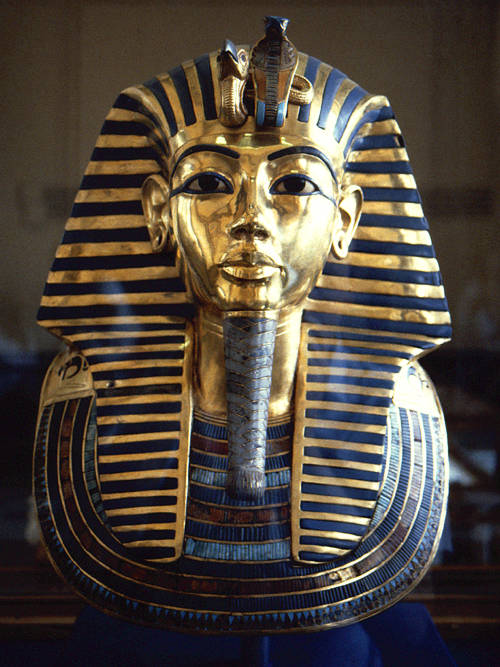 Two Ways of Understanding Pharoah's Hard Heart
Two Ways of Understanding Pharoah's Hard Heart
- Maybe we take the text at face value: sometimes Pharaoh deliberately resists God, and sometimes God supernaturally increases Pharaohs resistance. This seems unfair, but our perspective is admittedly limited, and maybe the Exodus can only happen if Pharaoh becomes more and more stubborn. Maybe things have to get worse before they can get better. And, as the Apostle Paul writes in Romans 9:14-19, we are not in the position to judge the Lord's actions. We are not God.
- Maybe God just gives Pharaoh over to the desires of his heart. Maybe God doesn't?make?Pharaoh do anything: maybe God just lets it happen. Maybe God knows that Pharaoh is not going to relent, but God's foreknowledge might still allow space for Pharoah's free (wicked) choice.
I don't have a good answer to this theological problem, but maybe that's okay. After all, life is not neat; life does not conform to a legal brief or a mathematical theorem. And neither does scripture.What do you think?
Don't Expect Compromise [#EatThisBook - Exodus 7]
In Exodus 7 we read about the first of the terrible plagues that the Lord inflicts on Egypt. Why? Why can't God be more easy-going?No one wants to hear it, but it's true: compromise isn't always possible, and sometimes conflict is unavoidable.In Exodus 7, Moses has asked Pharaoh to let the Israelites leave. Pharaoh refuses. In fact, Pharaoh will never agree. Exodus 7:13 describes Pharoah's heart as hard, i.e., he is utterly opposed to anything Moses has to say.We prefer conversation to conflict, and we'd like to look for compromise whenever possible. But sometimes conflict is unavoidable. One of the dominant themes of Exodus is that there are forces in this world utterly opposed to the things of God. Those forces will not compromise; the only course of action is conflict. C.S. Lewis, speaking in eschalotigcal terms, puts it like this:
C.S. Lewis, speaking in eschalotigcal terms, puts it like this:
There is no neutral ground in the universe: every square inch, every split second, is claimed by God and counterclaimed by Satan."
Don't think that the evil in this world will go without a fight. Either God wins, or evil wins: there's no compromise. Either Pharaoh keeps oppressing the Israelites, or Moses leads them to freedom: there's no compromise.I don't like conflict any more than you do, but sometimes conflict is unavoidable:
- the sex traffickers in our city are not going to be won over by reason and conversation; they'll have to be opposed and fought tooth and nail;
- your marriage is not going to just be healed; you'll have to ruthlessly fight for it;
- I can't just compromise with the selfishness in my heart; God needs to heal me from it.
The plagues God sends over Egypt are terrible and uncompromising, but they are necessary, because compromise isn't always possible. Direct conflict between God and Pharaoh cannot be avoided.
3 Reasons Why You'd Better Be Stubborn [#EatThisBook - Exodus 6]
Anyone can start something. Starting is easy. But it's what happens in the middle between starting and finishing that makes things difficult. And this is why you are going to have to be stubborn.
3 Reasons You'll Need to Be Stubborn
- Hope is hard. The Israelites have been so oppressed and downtrodden that believing that life could be better has become impossible for them: "Moses told this to the Israelites; but they would not listen to Moses, because of their broken spirit and their cruel slavery" (6:9). At work, at home, wherever you find yourself, you'll need to stubbornly insist:?things can be better! Many people have given up that hope long ago.
- Doubt will creep in. Moses, having encountered difficulty in front of him (in Pharaoh) and behind him (in the Israelites) inevitably begins to wonder "And how exactly is this going to work?" (6:12). When you doubt creeps in, you'll need to stubbornly insist:?fear is a liar and doesn't have the last word.

- Love is stubborn. Love bears all things, believes all things, hopes all things, endures all things (1 Corinthians 13). Love is stubborn. God loves his people and will not give up on them, no matter what (6:2-8). You and I have been created in the image of God and called by God to love this world. It's a world in desperate need of stubborn, unsentimental love.
Where do you need to add some stubbornness today?
No One Wants You to Do the Right Thing [#EatThisBook - Exodus 5]
People will tell you that they want you to do the right thing. But, people are lying. People don't want you to do the right thing if it will cause problems. And doing the right thing?always causes problems.See, if it were easy to do the right thing, the right thing would already be done. But doing the right thing is difficult.If there were no opposition to doing the right thing, the right thing would already be done. But there is opposition to doing the right thing. Bitter opposition. Those who do the right thing make enemies.Your friends and allies will tell you they want you to do the right thing, but when you start doing it, you will cause problems. You will stir up trouble. You will cause controversy. When you start causing problems, your friends and allies will tell you to take it easy, to stop being so radical, that you catch more flies with honey than with vinegar, that the old system wasn't perfect, but hey, what is?Of course your enemies don't want you to oppose them. Everyone knows that. Your enemies want the freedom to persist in doing the wrong thing without opposition. That's obvious. But the sad truth about life is that your allies (or those who should be your allies) often do not want you to oppose your enemies either. Your erstwhile allies?will tell you that your doing of the right thing is causing problems for?them. "Can't you tone it down a bit?" "You are giving us a bad name." "Things were better before you started making trouble."It wasn't just the Nazis who opposed Bonhoeffer--so did some other members of the Confessing Church, that church whose very reason for existing was to oppose the Nazis, who thought Bonhoeffer was too radical. "Dietrich, tone it down a bit. We agree with you, but you are giving us a bad name. You are causing too much trouble." So, Exodus chapter 5. Moses and Aaron are sent by the Lord to free the children of Israel from the oppressive hand of Pharaoh, and if you know anything about human nature, you should be able to predict what happens next:
So, Exodus chapter 5. Moses and Aaron are sent by the Lord to free the children of Israel from the oppressive hand of Pharaoh, and if you know anything about human nature, you should be able to predict what happens next:
- Moses and Aaron confront Pharaoh.
- Pharaoh doesn't like being confronted; consequently, he doubles-down on his evil and makes life worse for the Israelites.
- The Israelites don't like worse--who would?--and they complain to Moses and Aaron and blame them for their worsening predicament.
- Moses doesn't like being blamed for doing the right thing, and so he blames God for the whole thing.
No one wants you to do the right thing, at least, not if it will cause trouble. And doing the right thing always causes trouble.You've been warned.
Fear is Always a Lie [#EatThisBook--Exodus 4]
We're always afraid that what we have or what we are isn't enough. But that fear is always a lie because the Lord always gives exactly enough.Moses is afraid he won't be persuasive enough; Moses is afraid he won't be eloquent enough; Moses is afraid that one man won't be enough.But note that the Lord provides for Moses's need?out of what he has already given Moses.Moses is afraid he won't be persuasive enough, but the Lord uses the shepherd's staff Moses already has to persuade the people (4:1-5).Moses is afraid he won't be eloquent enough, but the Lord uses the mouth and mind Moses already has to speak to the people (4:10-12).Moses is afraid that one man won't be enough, but the Lord uses the brother Moses already has to be his spokesperson and partner (4:14-17, 27-31).We're afraid that what we have or what we are isn't enough. But the Lord has given us exactly what we need to accomplish exactly what he needs for us to accomplish.Where are you feeling like you don't have enough? Fear is a liar. P.S. Don't ask me about 4:24-26; I have no idea....
"God" Isn't God's Name (#EatThisBook Exodus 3)
Does God have a name? Zeus has a name; Marduk?has a name; Baal has a name. What's the name of the God of the Hebrews?Exodus 3 is important for (at least) two reasons. First, it's the account of one of the most consequential callings in history: the calling of Moses to be God's agent to free God's people. It's no exaggeration to say that the fate of the world hangs on Moses's curiosity to see the bush that burns without being consumed. Without Moses's turning aside, there's no Exodus, no Israel, no David, no Temple, no Judaism, and no Jesus.Second, Exodus 3 is important because we learn that God has a name. God's name is four Hebrew letters that from a very early time pious Jews reverently refused to pronounce. In fact, when they came upon the name of God (translated in Exodus 3:14 as "I AM WHO I AM") they would just say the word "Lord" instead, even though "Lord" isn't spelled like that.English translators of the Bible preserve this ancient Jewish reluctance to say the name of God by a peculiar technique that you've probably seen for years and never noticed.
- When the Hebrew says "God," English bibles say "God"
- When the Hebrew says "Lord," English bibles say "Lord"
- But, aside from here in Exodus 3 when it's translated "I AM," whenever the Hebrew says the special four letter name of God (called the tetragrammaton by scholars), English bibles say "LORD." All caps indicates that it's the special name for God that the Jews would have pronounced as "Lord."
God isn't an impersonal god. God is the LORD, and he introduces himself to Moses in an astoundingly gracious act of revelation.Whole libraries have been written about Exodus 3 and the name of God, but I'll stop there.What else struck you about today's passage?
#EatThisBook - Exodus 2
The Hebrew word for "ark" occurs in only two places in all of the Bible. Once in the Noah account in Genesis, and the second time?The "papyrus basket" that the Levite woman uses to hide the baby among the bulrushes is the Hebrew word for "ark." Isn't that fascinating?Some questions from today's chapter:
- Why call the basket an "ark"? What is the author implying?
- How might?Moses's strange upbringing--a Hebrew raised as an Egyptian--prepare him for the task the Lord has for him?
- How did word get out that Moses killed that Egyptian overseer?
- What is it that God remembers in 2:24? Why does that matter?
#EatThisBook - Exodus Chapter 1
Exodus begins in medias res with a listing of the names of the children of Jacob. (Jacob is also called Israel, and so his children are called the "Israelites." The Hebrew name for the book we call Exodus is "Names," taken from the first word of the Hebrew text of Exodus.) But who is Jacob, how did he have so many children, and how did they all end up in Egypt? To learn all that, you'll need to read Genesis....A few notes about Exodus 1:
- The Israelites are an immigrant people to Egypt, but the Egyptians, who initially welcomed them, begin to fear them because they grow numerous.
- The Egyptians decide to start oppressing the Israelites, but their oppression has the opposite effect (v.12): "The more they were oppressed, the more they multiplied and spread."
- Pharaoh then commands the death of all the Hebrew baby boys. In other words, Pharaoh plans to commit genocide. Some things never change....
- In Exodus 1, we already see what will be the main theme of the first half of the book: a struggle between Pharaoh, the divine king of Egypt, and the Living God. Things will get interesting.
Leave thoughts or questions in the comments below.
The Only Time I'll Ever Write About Ann Coulter
Ann?Coulter makes her living as a media personality by writing and saying provocative things. To cite a recent example, her August 6 post about Dr. Kent Brantly, the American medical missionary who contracted Ebola in Liberia after caring for infected Africans, is?entitled "Ebola Doc's Condition Downgraded to 'Idiotic'." I generally decline to be baited by provocateurs (pearls before swine?and all that) and I certainly have no wish to add to Ms. Coulter's lucrative notoriety. But this time, I can't help myself.I can't help commenting on Ms. Coulter's post because over at First Things?I read an excellent response to it that I want everyone I know to read. I can't resist sharing the First Things post?not because of what the author, Collin Garbarino, says in response to Ann Coulter, but because of what he says about the gospel and about how God works in the world.Ms. Coulter calls Dr. Brantly's actions "idiotic," but Mr. Garbarino reminds us that God's wisdom often looks foolish to the so-called wise of the world:
Christianity has always been a little topsy-turvy. The mightiest king in the universe was born in a lowly stable. The second person of the Godhead??emptied himself, by taking the form of a servant.??He had no form or majesty that we should look at him, and no beauty that we should desire him.?He had??no place to lay his head,? and he surrounded himself with a rag-tag group of fishermen and tax collectors. Jesus could stand as a righteous judge, but he allowed himself to die a sinner‘s death. Through sacrifice?God saved his people.Through death death is conquered. What‘s more foolish than dying in order to live? Christ calls his people to do just that. Take up your cross and follow him." [Emphasis mine.]
Mr. Garbarino goes on to take exception to Ann Coulter's suggestion that Dr. Brantly would have been better off converting a "Hollywood power-broker" than serving Africans without influence, correctly pointing out that worldly influence and power are not God's preferred way of changing the world:
God uses weakness in order to show his own power, and in spite of his habit of using the lowly, he‘s still managed to turn the world upside down. When people start thinking that they need the clout of a??Hollywood power-broker? to do God‘s work, they‘ve abandoned the gospel. If we attempt to convert the mighty so that we can use their resources, we're telling the world that God‘s power is insufficient. Does God need the rich and powerful to change the world? May it never be. God is sufficient in himself to do all he sets out to do." [Emphasis mine.]
The whole post is an excellent summary of the Church's claims about Jesus and worth the 5 minutes to read it. Read the whole thing here.For some reason, we live in a world in which people without wisdom--celebrities, media personalities, and Hollywood power-brokers--are often seen as wise. In such a world, I prefer the foolishness of God and the examples of idiots like Dr. Brantly.
1. As is obvious, I am not in agreement with Ann Coulter on this issue. In fairness, however, she does raise some important points in her post. For example, it is true that the American church should be doing more to care for the poor in our own country. But, loving our neighbors is not an either/or issue. According to Jesus, the Liberian with Ebola is just as much my neighbor as is the homeless man down the street: I have a responsibility to show mercy to them both.2. I was encouraged to see Dr. Russell Moore of the Southern Baptist Convention remind his readers that Christians ought to exercise more discernment before sitting at the feet of "hucksters and demagogues."
In Which I Compare Myself to Barack Obama
Have you ever known things about people that you had to keep to yourself?On Sunday afternoon, May 1, 2011, President Obama and the rest of the National Security Council gathered in the White House Situation Room to watch the final tense minutes of the Bin Laden raid. As Pete Souza's famous photo conveys, those were minutes of high drama, quite different from the President's surroundings of the previous evening. Less than 24 hours earlier on that previous Saturday evening, April 30, President Obama was watching an event with much less significance than the Bin Laden raid: the White House Correspondents Dinner. During the course of the evening, host and comedian Seth Meyers made a Bin Laden joke and President Obama smiled politely, all the while knowing that the Navy SEALs were already on their way to Abbatabad. The contrast is striking:‘the President surrounded by frivolity while events of life-and-death importance unfold. And he can't tell anyone....
Less than 24 hours earlier on that previous Saturday evening, April 30, President Obama was watching an event with much less significance than the Bin Laden raid: the White House Correspondents Dinner. During the course of the evening, host and comedian Seth Meyers made a Bin Laden joke and President Obama smiled politely, all the while knowing that the Navy SEALs were already on their way to Abbatabad. The contrast is striking:‘the President surrounded by frivolity while events of life-and-death importance unfold. And he can't tell anyone....
I Know Things About People
I know what it's like to have to keep things close. As a pastor, people tell me their stories, and so I know things about people that they normally keep private. I'm often struck, at the end of a day, at how much suffering so many people carry around with them. And the striking thing about their sufferings is that they are often carried in secret: life carries on all about them in its ordinary way.
"About Suffering They Were Never Wrong"
The great 16th century Flemish painter Pieter Bruegel the Elder was aware of the strange juxtaposition of how everyday life and life-altering suffering might often rub shoulders throughout the course of any given day. In fact, this juxtaposition is a part of two of his most famous paintings. I referenced this 1566 Bruegel painting--Census at Bethlehem--in my 2010 Christmas Eve sermon. It's an ordinary Flemish town on an ordinary winter day, but the title of the painting hints at something more, and when you look more closely, you see, in the bottom right corner, a hunched-over man leading a woman on a donkey. You think for a bit, and then you understand: it's Joseph leading Mary, in the pain of the last moments of pregnancy, hoping to find room in the inn.
I referenced this 1566 Bruegel painting--Census at Bethlehem--in my 2010 Christmas Eve sermon. It's an ordinary Flemish town on an ordinary winter day, but the title of the painting hints at something more, and when you look more closely, you see, in the bottom right corner, a hunched-over man leading a woman on a donkey. You think for a bit, and then you understand: it's Joseph leading Mary, in the pain of the last moments of pregnancy, hoping to find room in the inn.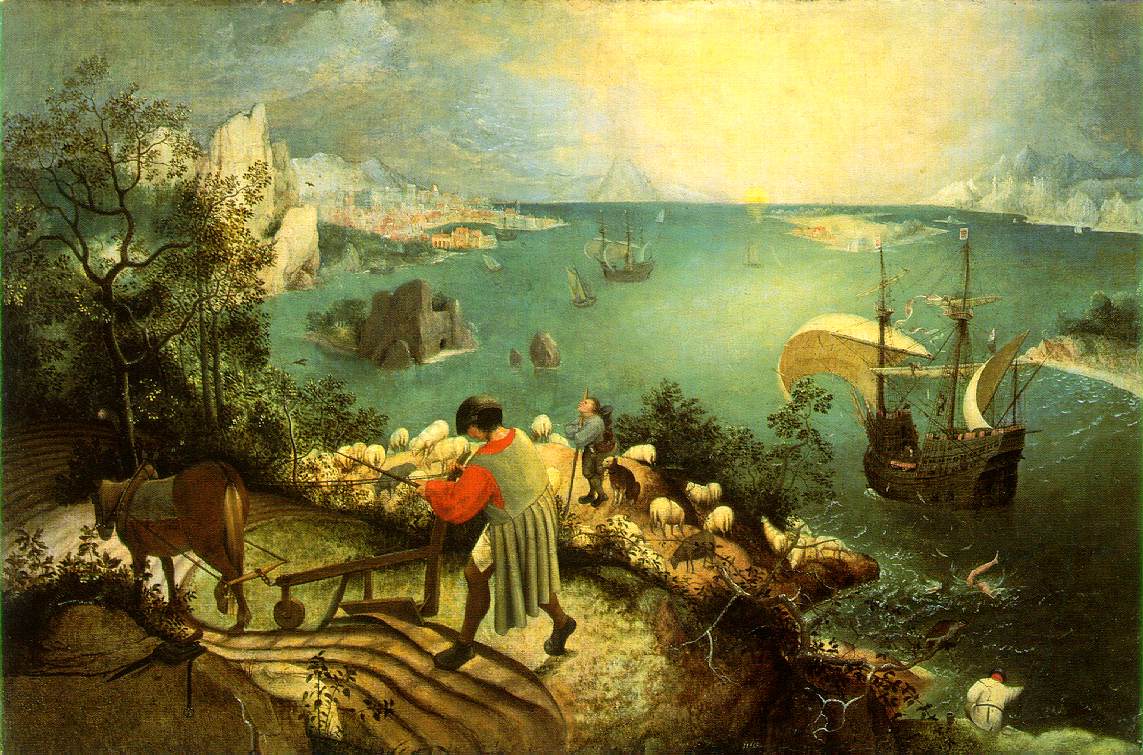 Bruegel probably painted the above landscape scene in the 1560s, and like Census at Bethlehem?it seems at first to be an ordinary scene from Flemish life. But with the help of the title--Landscape with the Fall of Icarus--you look more closely and notice two white legs sticking up out of the water in the bottom right of the painting. Icarus, of course, is the boy from the Greek myth who flew too closely to the sun and fell from the sky as a result.So, in the one painting, ordinary market day life goes on while the most important birth in history is about to take place in the most humiliating and filthy of circumstances; in the other, the plowman is pushing furrow after furrow while Daedalus's son falls out of the sky. What is Bruegel trying to tell us?
Bruegel probably painted the above landscape scene in the 1560s, and like Census at Bethlehem?it seems at first to be an ordinary scene from Flemish life. But with the help of the title--Landscape with the Fall of Icarus--you look more closely and notice two white legs sticking up out of the water in the bottom right of the painting. Icarus, of course, is the boy from the Greek myth who flew too closely to the sun and fell from the sky as a result.So, in the one painting, ordinary market day life goes on while the most important birth in history is about to take place in the most humiliating and filthy of circumstances; in the other, the plowman is pushing furrow after furrow while Daedalus's son falls out of the sky. What is Bruegel trying to tell us?
Mus?e des Beaux Arts
The Anglo-American poet W.H. Auden saw both of those paintings in 1938 while visiting the Royal Museums of Fine Arts in Brussels, Belgium, and he was moved to write the following famous poem about his insight into the paintings:
About suffering they were never wrong, The Old Masters:How well they understood its human position;How it takes place while someone else is eatingOr opening a window or just walking dully along;How, when the aged are reverently,Passionately waiting for the miraculous birth,There always must be childrenWho did not specially want it to happen,Skating on a pond at the edge of the wood:They never forgot that even the dreadful martyrdomMust run its course anyhow in a corner,Some untidy spotWhere the dogs go on with their doggy lifeAnd the torturer's horse scratches its innocent behind on a tree.In Breughel's Icarus, for instance:How everything turns away quite leisurely from the disaster;The ploughman may have heard the splash,The forsaken cry,But for him it was not an important failure;The sun shone as it had to on the white legsDisappearing into the green water;And the expensive delicate shipThat must have seen something amazing,A boy failing out of the sky,Had somewhere to get to and sailed calmly on.Mus?e des Beaux Arts (1939)
Auden's poem elaborates Bruegel's point: suffering goes on?right in the midst of ordinary life.
- One mother addresses envelopes for her six year-old son's birthday party, while another holds her son's hand as he receives his weekly chemotherapy treatments;
- One hotel room hosts a man whose wife has just left him, while another contains a pair of giddy newlyweds;
- One man picks up his coffee from the coffee shop, his only small pleasure in a day of misery, while another pays for his cup while on his way to his much-anticipated yearly hunting trip with his adult son.
As Bruegel and Auden remind us, suffering is not separated from ordinary life; rather, it's woven into it. All around us are people carrying what would seem to be unbearable burdens, people in the midst of intractable problems, while the rest of us go about daily life. I know this is true, because I hear people's stories.
Strawberries, Small Talk, and Suffering
A few weeks ago, my wife and I had planned to have my staff over to our house for lunch. Right beforehand I had heard sickening news about someone I care about, and that news was heavy on my mind. But, the news was confidential, and we were expecting lunch guests, so I tried to push it aside and jovially welcome our guests. It was a surreal contrast: curry chicken lettuce wraps and summer strawberries and small talk, while I kept thinking about the suffering person I'd just heard about not sixty minutes before.But that's life, isn't it? I hear more about other people's sufferings than the average person, perhaps, but you know about sufferings too, either your own or others, and you also know that life goes on. Bruegel was right: the greatest sufferings happen right alongside the greatest trivialities.
The Power of a Simple Courtesy
People all around us are carrying heavy burdens, and most of the time, you can't tell by looking at them. This fact makes me regret all the times I failed to show courtesy to strangers, or took unnecessary offense or became annoyed at the behavior of another person. Who knows with which secret difficulties they were ensnarled?Here's what I do know: in a world in which so many people are carrying secret sufferings, small, simple courtesies can mean the world.
"Less, But Better"
Sure, we're busy, but what are we actually getting done?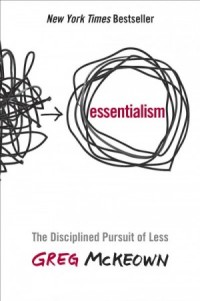 Rather than getting more done, what about getting the right things done? This is Greg McKeown's suggestion in his book Essentialism. If you are anything like me, asking yourself the question "Where can I make the greatest contribution?" is embarrassing, as you'll be forced to admit that though you are very busy, much of your effort is expended in activity that takes you sideways more than it takes you forward."Less, but better" is the shorthand summary for Mr. McKeown's book--who could argue with that?Like many of these sorts of business/leadership books, Essentialism is a bit too long and contains a fair amount of filler--as if the author had a page quota he needed to hit--but I still found it worth reading. I particularly liked Mr. McKeown's insistence that every part of life involves a trade-off; instead of thinking we can avoid problems altogether, we ought to be asking ourselves, "Which problem do I want?"Short, easy read. Recommended.What can you say "No" to this week? (Very politely, of course....)
Rather than getting more done, what about getting the right things done? This is Greg McKeown's suggestion in his book Essentialism. If you are anything like me, asking yourself the question "Where can I make the greatest contribution?" is embarrassing, as you'll be forced to admit that though you are very busy, much of your effort is expended in activity that takes you sideways more than it takes you forward."Less, but better" is the shorthand summary for Mr. McKeown's book--who could argue with that?Like many of these sorts of business/leadership books, Essentialism is a bit too long and contains a fair amount of filler--as if the author had a page quota he needed to hit--but I still found it worth reading. I particularly liked Mr. McKeown's insistence that every part of life involves a trade-off; instead of thinking we can avoid problems altogether, we ought to be asking ourselves, "Which problem do I want?"Short, easy read. Recommended.What can you say "No" to this week? (Very politely, of course....)

![Some Brief Thoughts About Killing [#EatThisBook - Exodus 11]](https://images.squarespace-cdn.com/content/v1/5d70f59aefca59000162e4e6/1568657635464-R9978QF0EU93IY86CPE8/image-asset.jpeg)


![Is Life Fated, Or Are We Free? [#EatThisBook - Exodus 10]](https://images.squarespace-cdn.com/content/v1/5d70f59aefca59000162e4e6/1568657633253-9XSFE653OYXUG0CTSBZ4/image-asset.jpeg)

![You're Not Exempt From Cause and Effect [#EatThisBook - Exodus 9]](https://images.squarespace-cdn.com/content/v1/5d70f59aefca59000162e4e6/1568657632069-159VOKCXVCCTM7LG4713/image-asset.jpeg)
![Who's Responsible for Pharaoh? [#EatThisBook - Exodus 8]](https://images.squarespace-cdn.com/content/v1/5d70f59aefca59000162e4e6/1568657631153-3T52KP0B1T8MVSW6L1JS/image-asset.jpeg)
![Don't Expect Compromise [#EatThisBook - Exodus 7]](https://images.squarespace-cdn.com/content/v1/5d70f59aefca59000162e4e6/1568657627581-2I8C53ZBHU7BEISR8QCT/image-asset.jpeg)
![3 Reasons Why You'd Better Be Stubborn [#EatThisBook - Exodus 6]](https://images.squarespace-cdn.com/content/v1/5d70f59aefca59000162e4e6/1568657626452-VJXZG8CQ0GS46XFG62E7/image-asset.jpeg)
![No One Wants You to Do the Right Thing [#EatThisBook - Exodus 5]](https://images.squarespace-cdn.com/content/v1/5d70f59aefca59000162e4e6/1568657623752-8IV4JHJBPCOVP963T7TN/image-asset.jpeg)
![Fear is Always a Lie [#EatThisBook--Exodus 4]](https://images.squarespace-cdn.com/content/v1/5d70f59aefca59000162e4e6/1568657622653-73CGAC9K7OCS9D7RKFF4/image-asset.jpeg)





